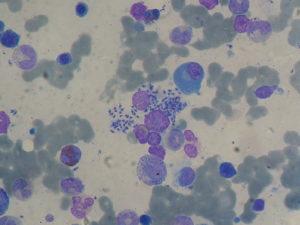
Bone marrow aspiration: Leishmaniasis (Leishmania sp.) in liver transplant recipient. Paulo Henrique Orlandi Mourao. Wikimedia Commons.
In response to Leishmania infection CD8+ T cells have been shown to produce IFN-γ, an essential cytokine required for control of infection. However, studies have shown that IFN-γ produced by CD8+ T cells in the absence of CD4 T cells is not sufficient to control Leishmania infection, and leads severe pathology. Researchers from the University of Pennsylvania, aimed to determine factors that contribute to the inability of CD8 T cell to control Leishmania infection.
To determine why IFN-γ production by CD8+ T cells does not control Leishmania replication, CD8+ functional responses were measured in draining lymph node (dLN) and skin tissue of Leishmania infected mice. Surprisingly, CD8 T cells from the dLN and not skin were able to produce IFN-γ in response to non-specific stimulation. In fact, when compared to CD4 T cells that were able to produce IFN-γ , CD8 T cells isolated from the site of Leishmania infection (skin) were unable to produce IFN-γ. To demonstrate that CD8 T cells isolated from Leishmania infected skin are functional, researchers showed that isolated CD8+ T cells from Leishmania infected skin are capable of proliferating and expanding in response to secondary antigen exposure. Suggesting that CD8 T cells found in the skin are innately unable to produce IFN-γ .
Researchers observed low levels of IL-12, a cytokine essential for induction of IFN-γ by T cells, in Leishmania infected skin from mice and humans. This suggests that inability of CD8 T cells found in skin tissue to produce IFN-γ is due to low levels of IL-12 in the skin microenvironment. To confirm this, Novais et al., showed that in vivo administration of IL-12, resulted in significant induction of IFN-γ by CD8+ T cells. Despite induction of IFN-γ , CD8+ T cells in the presence of IL-12, these T cells were still unable to control Leishmania infection. This illustrates that non-protective CD8+ T cells responses against Leishmania infection is not due to inability to produce high levels of IFN-γ but due to other immune responses, that are yet to be defined. Highlighting the need for future research on the role of CD8+ T cells during Leishmania infection.
Journal Article: Novais et al. 2018. CD8+ T Cells Lack Local Signals To Produce IFN-γ in the Skin during Leishmania Infection. Journal of Immunology
Article by Cheleka AM Mpande











